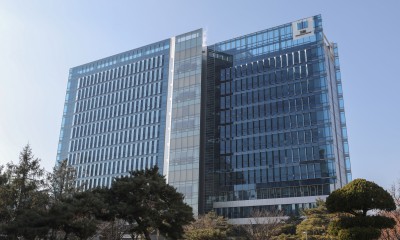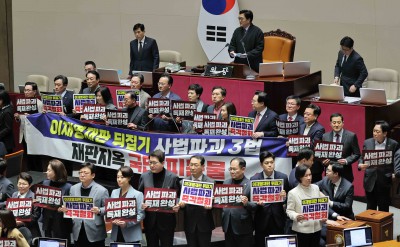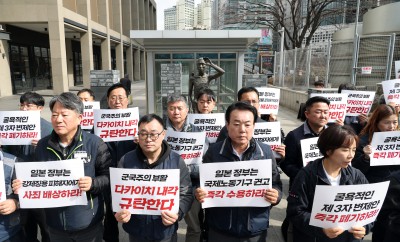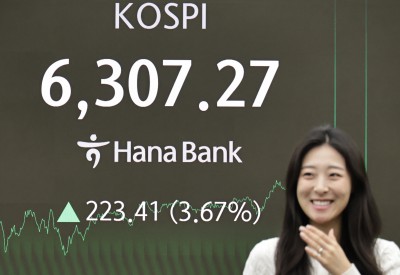[뉴스핌=김연순 기자]
The Joint Ministerial Statement of The 13th ASEAN+3 Finance Ministers’ Meeting 2 May 2010, Tashkent, Uzbekistan
Introduction
1. We, the Finance Ministers of ASEAN, China, Japan and Korea (ASEAN+3), convened our thirteenth meeting in Tashkent, Uzbekistan, under the co-chairmanship of H.E. Vu Van Ninh, Minister of Finance of the Socialist Republic of Vietnam and H.E. Xie Xuren, Minister of Finance of the People’s Republic of China. The President of the Asian Development Bank (ADB) and the Deputy Secretary General of ASEAN were also present at our meeting.
2. We exchanged views on regional economic and financial development and policies. We also reviewed the progress of regional financial cooperation, including the Chiang Mai Initiative Multilateralisation (CMIM), the Asian Bond Markets Initiative (ABMI) and the ASEAN+3 Research Group. Furthermore, we explored ways to further enhance these initiatives for higher efficiency and more positive impact.
3. In particular, we are pleased to announce that the CMIM agreement came into effect on 24 March 2010. Consensus has been reached on all the key elements of the regional macroeconomic surveillance unit of the CMIM, called the ASEAN+3 Macroeconomic Research Office (AMRO). We are also pleased to announce the establishment of the Credit Guarantee and Investment Facility (CGIF) as a trust fund of ADB with an initial capital of US$700 million.
Recent Economic and Financial Developments in the Region
4. Against the backdrop of an unprecedented international financial crisis, we are pleased that member countries have undertaken proactive policy measures including economic stimulus packages in a decisive and timely manner to sustain financial stability and restore economic growth. The East Asian economies are among the first to rebound soundly, and have become one of the key drivers of the global economy recovery.
5. However, we recognize that downside risks to the overall global recovery remain: the ample liquidity in the global market driving up asset prices and increasing inflationary pressures; sovereign debt risks precipitating renewed global risk aversion and destabilizing international capital flows into Asian economies; the slow recovery of the labor markets in developed economies hindering the recovery of global private consumption. Furthermore, the East Asian economies now face the challenge of promoting sound economic structural reform in preparation for the next phase of growth.
6. In this context, we are determined to remain vigilant on the market developments, to maintain the consistency and stability of macroeconomic policies, and to adopt appropriate exit strategies, in accordance with our respective economic fundamentals, to promote medium and long term fiscal sustainability and financial stability. We reiterated our commitment to accelerate and deepen economic structural reforms, promote domestic demand and employment, resist protectionism and further promote trade and investment. We believe that these efforts will significantly contribute to the recovery and long-term prosperity of the world economy.
7. In this regard, we recognize the importance of issues discussed in the G20 process in pursuit of strong, sustainable and balanced growth. To this end, we welcome the chairmanship of Korea in the G20 Seoul Summit this November.
Strengthen Regional Financial Cooperation
8. On the Chiang Mai Initiative Multilateralization (CMIM), the CMIM agreement came into effect on 24 March 2010. (Annex 1: Key Points of CMIM Agreement) We also agreed to the adjustment in the contributions of Indonesia, Malaysia, Philippines, Singapore and Thailand for them to contribute equally to the CMIM. Having developed from the existing CMI bilateral swap network, the CMIM is in nature a multilateral currency swap arrangement which covers all ASEAN+3 members. With the core objectives (i) to address balance of payment and short-term liquidity difficulties in the region, and (ii) to supplement the existing international financial arrangements, the CMIM will further enhance regional capacity to safeguard against downside risks and challenges in the global economy. We instructed our deputies to further enhance the effectiveness of CMIM.
9. We have reached agreement on all the key elements of the AMRO. The AMRO will be located in Singapore to monitor and analyze regional economies, which contributes to the early detection of risks, swift implementation of remedial actions, and effective decision-making of the CMIM. We instructed that technical details necessary for actual establishment of AMRO be worked out for the start of the AMRO operations early next year. To further enhance surveillance, we also agreed to improve the Economic Review and Policy Dialogue (ERPD) process.
10. On the Asian Bond Markets Initiative (ABMI), we stressed the importance of the ABMI in promoting development of local currency-denominated bond markets and enhancing macroeconomic and financial stability. We appreciated the fact that in the midst of the recent economic crisis, many countries in the region successfully issued government bonds to finance their economic stimulus packages. We also recognized the increasing importance of mobilizing regional savings for regional investments, in order to sustain sound economic growth for ASEAN+3 countries. In this regard, we instructed our Deputies to explore ways to further promote cross-border bond transactions in the region along with the development of local currency-denominated bond markets.
11. We are pleased to announce the establishment of the CGIF as a trust fund of ADB with an initial capital of US$700 million. The main objective of the CGIF is to support the issuance of corporate bonds in our region, and thus contribute to the development of regional bond markets. We along with ADB will soon subscribe for the financial contribution and finalize necessary technical details including the Operational Policies and the business plan for the CGIF to start operations before the end of 2010.
12. We took note of the Group of Experts’ findings and suggestions on facilitating cross-border bond transactions and settlement, and welcomed the establishment of the technical working group on Regional Settlement Intermediary (RSI) to further evaluate the policy recommendations. We endorsed the establishment of ASEAN+3 Bond Market Forum (ABMF) as a common platform to foster standardization of market practices and harmonization of regulations relating to cross-border bond transactions in the region. We expect tangible results from the forum in a timely manner so that the process evolves into a continuous exercise. We also welcomed the pilot project on cross-border infrastructure bond issuance by the Lao government, which is expected to be implemented in Thailand by the end of this year.
13. On further enhancing the regional financial cooperation, we recognized that in face of new challenges posed by the need to preserve global financial stability and promote sustainable economic development, we agreed to bring the regional financial cooperation to a higher and more strategic level. In this respect, we have tasked our deputies to conduct an immediate assessment of our previous achievements in regional financial cooperation and suggest the strategic direction of ASEAN+3 financial cooperation. We have also agreed to set up a “Taskforce on the Future Priorities of ASEAN+3 Financial Cooperation,” which will provide important support to our deputies on this endeavor.
14. On the ASEAN+3 Research Group, we acknowledged the efforts of the Research Group on studies regarding the local currencies-denominated trade settlement and the liquidity risk management in the region. We endorsed three topics for the 2010/2011 Research Group activities as follows: (1) Possible Use of Regional Monetary Units - identification of issues for practical use; (2) Lessons from Asia’s Experiences with Sudden Capital Flows; and (3) Fiscal and Financial Impacts of the Climate Change and Policy Challenges in East Asia.
Conclusion
15. We expressed our appreciation to the government of the Socialist Republic of Vietnam and the People’s Republic of China for their excellent arrangements as co-chairs of the ASEAN+3 Finance Ministers’ Process in 2010. We also thanked the government of the Republic of Uzbekistan for its warm hospitality.
16. We agreed to meet in Vietnam in 2011. Indonesia and Japan will be the co-chairs of the ASEAN+3 Finance Ministers’ Process in 2011.
Key Points of CMI Multilateralization Agreement
Basic Objective
1. The CMIM Agreement contains 24 Articles and 9 schedules. The basic objectives of this CMIM Agreement are (i) to address short-term liquidity difficulties in the region and (ii) to supplement the existing international financial arrangements.
CMIM Contract Parties and Effective Date
2. CMIM Contract parties comprise the 26 Finance Ministers and Central Bank Governors of ASEAN+3 and the Monetary Authority of Hong Kong, China. This CMIM Agreement became effective on 24 March 2010.
Total Size and Contribution (Attachment)
3. The total size of CMIM is USD 120,000,000,000 (one hundred twenty billion). Individual country’s contribution, borrowing multiples and voting power are as agreed in the AFMM+3 in Bali in May 2009 and as amended in the AFMM+3 in Tashkent, Uzbekistan on 2 May 2010. The contribution to CMIM is agreed to be made through the exchange of Commitment Letter that commits to provide financial support within the amount of contribution.
Drawing
4. The Central Bank of ASEAN+3 countries as well as Monetary Authority of Hong Kong, China are to swap their local currencies with the US dollar for an amount up to their contribution multiplied by their respective purchasing multiples.
Maturity
5. Each drawing of liquidity support in the form of bilateral currency swap shall mature basically 90 days after the date of drawing, and can be rolled over for 7 times at the maximum (approximately 2 years).
Coordinating Countries
6. Two countries will be appointed to coordinate the swap activation process when a request for drawing is made. Two Coordinating Countries shall be the two co-chairs of the ASEAN+3 Finance Minister Process, one Coordinating Country from ASEAN member countries and the other from China, Japan and Korea.
Decision-making
7. Fundamental issues (total size of CMIM, contribution of each CMIM party etc) for the CMIM would be determined by a consensus approval at Ministerial Level Decision Making Body, which consists of ASEAN+3 Finance Ministers. Executive level issues (initial execution of drawing, renewal of drawing, events of default) would be determined by 2/3 majority at Executive Level Decision Making Body (ELDMB), which comprises the deputy-level representatives of ASEAN+3 Finance Ministries and Central Banks and Monetary Authority of Hong Kong, China.
Conditions Precedent and Covenants
8. A CMIM party which requests for drawing has to meet conditions before the voting for a swap request; such as completion of review of the economic and financial situation and no events of default. As well, each CMIM party is requested to comply with covenants such as submission of the periodic surveillance report and participation in the ASEAN+3 Economic Review and Policy Dialogue.
Escape
9. In principle, each of the CMIM parties may only escape from contributing to a swap request by obtaining an approval of Executive Level Decision Making Body. In exceptional cases such as an extraordinary event or instance of force majours and domestic legal limitations, escape is possible without obtaining ELDMB approval.
Periodic Review of CMIM Arrangement
10. The CMIM parties shall jointly carry out a basic review of the CMIM Arrangement and the key terms and conditions of the CMIM every 5 years. Also, ad-hoc reviews may be conducted when necessary.
The Joint Ministerial Statement of The 13th ASEAN+3 Finance Ministers’ Meeting 2 May 2010, Tashkent, Uzbekistan
Introduction
1. We, the Finance Ministers of ASEAN, China, Japan and Korea (ASEAN+3), convened our thirteenth meeting in Tashkent, Uzbekistan, under the co-chairmanship of H.E. Vu Van Ninh, Minister of Finance of the Socialist Republic of Vietnam and H.E. Xie Xuren, Minister of Finance of the People’s Republic of China. The President of the Asian Development Bank (ADB) and the Deputy Secretary General of ASEAN were also present at our meeting.
2. We exchanged views on regional economic and financial development and policies. We also reviewed the progress of regional financial cooperation, including the Chiang Mai Initiative Multilateralisation (CMIM), the Asian Bond Markets Initiative (ABMI) and the ASEAN+3 Research Group. Furthermore, we explored ways to further enhance these initiatives for higher efficiency and more positive impact.
3. In particular, we are pleased to announce that the CMIM agreement came into effect on 24 March 2010. Consensus has been reached on all the key elements of the regional macroeconomic surveillance unit of the CMIM, called the ASEAN+3 Macroeconomic Research Office (AMRO). We are also pleased to announce the establishment of the Credit Guarantee and Investment Facility (CGIF) as a trust fund of ADB with an initial capital of US$700 million.
Recent Economic and Financial Developments in the Region
4. Against the backdrop of an unprecedented international financial crisis, we are pleased that member countries have undertaken proactive policy measures including economic stimulus packages in a decisive and timely manner to sustain financial stability and restore economic growth. The East Asian economies are among the first to rebound soundly, and have become one of the key drivers of the global economy recovery.
5. However, we recognize that downside risks to the overall global recovery remain: the ample liquidity in the global market driving up asset prices and increasing inflationary pressures; sovereign debt risks precipitating renewed global risk aversion and destabilizing international capital flows into Asian economies; the slow recovery of the labor markets in developed economies hindering the recovery of global private consumption. Furthermore, the East Asian economies now face the challenge of promoting sound economic structural reform in preparation for the next phase of growth.
6. In this context, we are determined to remain vigilant on the market developments, to maintain the consistency and stability of macroeconomic policies, and to adopt appropriate exit strategies, in accordance with our respective economic fundamentals, to promote medium and long term fiscal sustainability and financial stability. We reiterated our commitment to accelerate and deepen economic structural reforms, promote domestic demand and employment, resist protectionism and further promote trade and investment. We believe that these efforts will significantly contribute to the recovery and long-term prosperity of the world economy.
7. In this regard, we recognize the importance of issues discussed in the G20 process in pursuit of strong, sustainable and balanced growth. To this end, we welcome the chairmanship of Korea in the G20 Seoul Summit this November.
Strengthen Regional Financial Cooperation
8. On the Chiang Mai Initiative Multilateralization (CMIM), the CMIM agreement came into effect on 24 March 2010. (Annex 1: Key Points of CMIM Agreement) We also agreed to the adjustment in the contributions of Indonesia, Malaysia, Philippines, Singapore and Thailand for them to contribute equally to the CMIM. Having developed from the existing CMI bilateral swap network, the CMIM is in nature a multilateral currency swap arrangement which covers all ASEAN+3 members. With the core objectives (i) to address balance of payment and short-term liquidity difficulties in the region, and (ii) to supplement the existing international financial arrangements, the CMIM will further enhance regional capacity to safeguard against downside risks and challenges in the global economy. We instructed our deputies to further enhance the effectiveness of CMIM.
9. We have reached agreement on all the key elements of the AMRO. The AMRO will be located in Singapore to monitor and analyze regional economies, which contributes to the early detection of risks, swift implementation of remedial actions, and effective decision-making of the CMIM. We instructed that technical details necessary for actual establishment of AMRO be worked out for the start of the AMRO operations early next year. To further enhance surveillance, we also agreed to improve the Economic Review and Policy Dialogue (ERPD) process.
10. On the Asian Bond Markets Initiative (ABMI), we stressed the importance of the ABMI in promoting development of local currency-denominated bond markets and enhancing macroeconomic and financial stability. We appreciated the fact that in the midst of the recent economic crisis, many countries in the region successfully issued government bonds to finance their economic stimulus packages. We also recognized the increasing importance of mobilizing regional savings for regional investments, in order to sustain sound economic growth for ASEAN+3 countries. In this regard, we instructed our Deputies to explore ways to further promote cross-border bond transactions in the region along with the development of local currency-denominated bond markets.
11. We are pleased to announce the establishment of the CGIF as a trust fund of ADB with an initial capital of US$700 million. The main objective of the CGIF is to support the issuance of corporate bonds in our region, and thus contribute to the development of regional bond markets. We along with ADB will soon subscribe for the financial contribution and finalize necessary technical details including the Operational Policies and the business plan for the CGIF to start operations before the end of 2010.
12. We took note of the Group of Experts’ findings and suggestions on facilitating cross-border bond transactions and settlement, and welcomed the establishment of the technical working group on Regional Settlement Intermediary (RSI) to further evaluate the policy recommendations. We endorsed the establishment of ASEAN+3 Bond Market Forum (ABMF) as a common platform to foster standardization of market practices and harmonization of regulations relating to cross-border bond transactions in the region. We expect tangible results from the forum in a timely manner so that the process evolves into a continuous exercise. We also welcomed the pilot project on cross-border infrastructure bond issuance by the Lao government, which is expected to be implemented in Thailand by the end of this year.
13. On further enhancing the regional financial cooperation, we recognized that in face of new challenges posed by the need to preserve global financial stability and promote sustainable economic development, we agreed to bring the regional financial cooperation to a higher and more strategic level. In this respect, we have tasked our deputies to conduct an immediate assessment of our previous achievements in regional financial cooperation and suggest the strategic direction of ASEAN+3 financial cooperation. We have also agreed to set up a “Taskforce on the Future Priorities of ASEAN+3 Financial Cooperation,” which will provide important support to our deputies on this endeavor.
14. On the ASEAN+3 Research Group, we acknowledged the efforts of the Research Group on studies regarding the local currencies-denominated trade settlement and the liquidity risk management in the region. We endorsed three topics for the 2010/2011 Research Group activities as follows: (1) Possible Use of Regional Monetary Units - identification of issues for practical use; (2) Lessons from Asia’s Experiences with Sudden Capital Flows; and (3) Fiscal and Financial Impacts of the Climate Change and Policy Challenges in East Asia.
Conclusion
15. We expressed our appreciation to the government of the Socialist Republic of Vietnam and the People’s Republic of China for their excellent arrangements as co-chairs of the ASEAN+3 Finance Ministers’ Process in 2010. We also thanked the government of the Republic of Uzbekistan for its warm hospitality.
16. We agreed to meet in Vietnam in 2011. Indonesia and Japan will be the co-chairs of the ASEAN+3 Finance Ministers’ Process in 2011.
Key Points of CMI Multilateralization Agreement
Basic Objective
1. The CMIM Agreement contains 24 Articles and 9 schedules. The basic objectives of this CMIM Agreement are (i) to address short-term liquidity difficulties in the region and (ii) to supplement the existing international financial arrangements.
CMIM Contract Parties and Effective Date
2. CMIM Contract parties comprise the 26 Finance Ministers and Central Bank Governors of ASEAN+3 and the Monetary Authority of Hong Kong, China. This CMIM Agreement became effective on 24 March 2010.
Total Size and Contribution (Attachment)
3. The total size of CMIM is USD 120,000,000,000 (one hundred twenty billion). Individual country’s contribution, borrowing multiples and voting power are as agreed in the AFMM+3 in Bali in May 2009 and as amended in the AFMM+3 in Tashkent, Uzbekistan on 2 May 2010. The contribution to CMIM is agreed to be made through the exchange of Commitment Letter that commits to provide financial support within the amount of contribution.
Drawing
4. The Central Bank of ASEAN+3 countries as well as Monetary Authority of Hong Kong, China are to swap their local currencies with the US dollar for an amount up to their contribution multiplied by their respective purchasing multiples.
Maturity
5. Each drawing of liquidity support in the form of bilateral currency swap shall mature basically 90 days after the date of drawing, and can be rolled over for 7 times at the maximum (approximately 2 years).
Coordinating Countries
6. Two countries will be appointed to coordinate the swap activation process when a request for drawing is made. Two Coordinating Countries shall be the two co-chairs of the ASEAN+3 Finance Minister Process, one Coordinating Country from ASEAN member countries and the other from China, Japan and Korea.
Decision-making
7. Fundamental issues (total size of CMIM, contribution of each CMIM party etc) for the CMIM would be determined by a consensus approval at Ministerial Level Decision Making Body, which consists of ASEAN+3 Finance Ministers. Executive level issues (initial execution of drawing, renewal of drawing, events of default) would be determined by 2/3 majority at Executive Level Decision Making Body (ELDMB), which comprises the deputy-level representatives of ASEAN+3 Finance Ministries and Central Banks and Monetary Authority of Hong Kong, China.
Conditions Precedent and Covenants
8. A CMIM party which requests for drawing has to meet conditions before the voting for a swap request; such as completion of review of the economic and financial situation and no events of default. As well, each CMIM party is requested to comply with covenants such as submission of the periodic surveillance report and participation in the ASEAN+3 Economic Review and Policy Dialogue.
Escape
9. In principle, each of the CMIM parties may only escape from contributing to a swap request by obtaining an approval of Executive Level Decision Making Body. In exceptional cases such as an extraordinary event or instance of force majours and domestic legal limitations, escape is possible without obtaining ELDMB approval.
Periodic Review of CMIM Arrangement
10. The CMIM parties shall jointly carry out a basic review of the CMIM Arrangement and the key terms and conditions of the CMIM every 5 years. Also, ad-hoc reviews may be conducted when necessary.























